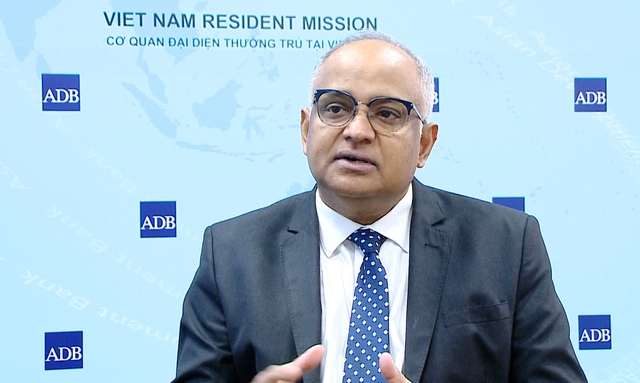Viet Nam achieves good results despite challenges: ADB
VGP - The Asian Development Bank (ADB) hails Viet Nam’s economic achievements in 2023, especially in terms of stabilizing monetary policy and controlling inflation, giving the unexpected challenges that the country faces throughout the year.

Country Director of the ADB for Viet Nam Shantanu Chakraborty - Photo: VGP
In a recent interview with the VGP, Country Director of the ADB for Viet Nam Shantanu Chakraborty said, on the monetary policy front, the government has done well to ensure resilience.
Viet Nam was one of the first countries to start reducing interest rates. Interest rates was reduced four times before June 2023 in response to some uncertainties about economic growth while inflation has been brought under control.
"The State Bank of Viet Nam acted very proactively in terms of reducing interest rates so that the overall accommodative monetary policy contributed to the resilience of the economy in 2023", noted the ADB Country Director.
On the fiscal front, the significant boost in public investment disbursement is among key factors to stimulate economic growth, he said, adding that the disbursement of public investments represents 75 percent of the full-year plan.
He underlined the need to boost infrastructure investment, push the overall market sentiments, and make it easier for doing business. Remarkably, a lot of positive steps have been taken such as the 2 percent value-added tax (VAT) reduction extension to put more money in the people's hands.
Although Viet Nam has not achieved the economic growth target of 6.5 percent as it set for 2023, its results are commendable. The growth target is really not something that is set in stone. This is the aspiration that the government started the year and that is a policy target.
The year 2023 was a very challenging year for Viet Nam in general due to uncertainties in the global economy. The nation faced a lot of challenges in the year with declining economic activity and demand in some of its major trading partners.
Over the last few years, the Vietnamese economy has become very export- oriented. Based on latest analysis, those economies, which have been dependent on exports such Viet Nam, Thailand, Malaysia, and other ones, their economic growth forecasts have been downgraded because of the global economic slowdown.
In addition, the geopolitical tensions have caused disruptions in the supply chain during the year while the high interest rates also impacted the competitive advantage of Vietnamese products and services in the world.
Some domestic challenges included slow implementation of projects and the interest rate differential between the VND and USD.
Overall the economy was managed to well given all these unexpected challenges that Viet Nam has faced throughout the period. Monetary policy has been kept robust. Inflation has been kept under control, he noted.
"A more coordinated approach that harmonizes the monetary effects and fiscal efforts will be very crucial to bring the economy back into high level of economic growth that the nation has achieved in the couple of years", Shantanu Chakraborty suggested.
Boosting internal demand to stimulate economic growth in 2024
Regarding the global economic prospects in 2024, the ADB Country Director said, despite global economic uncertainties, some parts of the world have seen early signs of economic recovery.
The U.S. economy has remained strong in 2023 and shown remarkable signs of recovery. However, Japan and EU's economies continue a moderate recovery. Besides, the geopolitical turmoil may adversely impact commodity markets and access to credit so that next year is a mixed bag.
"We have kept forecast for Viet Nam's GDP growth in 2024 at 6 percent, which is second highest among ASEAN Member States assuming an uptick in the economies of Viet Nam's main trading partners and positive developments in geopolitical tensions", shared the ADB Country Director.
To overcome challenges in 2024, according to Shantanu Chakraborty, a lot of focus needs to be put to ensure the competitive advantage of Viet Nam as a foreign direct investment (FDI) destination.
It is necessary to continue maintaining Viet Nam as a preferred destination for foreign investments, he said, suggesting the nation upscale the products and services, heading to a higher value-added set of products and services that can continue to be in high demand in the global market.
Furthermore, domestic consumption would be one of the main growth drivers because reducing dependence on external demand will minimize the impact of external challenges.
In 2023, the countries where domestic consumption and demand have been high, such as India, China, Indonesia and the Philippines, have continued to make robust economic growths.
Any policy impact at strengthening domestic consumption and demand will do Viet Nam very well as it goes into 2024, he emphasized.
The nation can boost internal demand by putting more money into the hands of people with an expansionary monetary policy combined with a fiscal policy, he noted, adding that this is a time to also embark reforms in various sectors in need of further investments and specifically preferred sector.
"Viet Nam is a country that is subject to a lot of climate change vulnerability and now is the time to really focus more on how we can boost investment in resilient sustainable infrastructure", recommended the ADB Country Director.
He expressed his belief that a lot of focus needs to be put in 2024 and beyond to ensure investments which in turn will have an effect on maintaining the momentum in Viet Nam's economic growth./.

